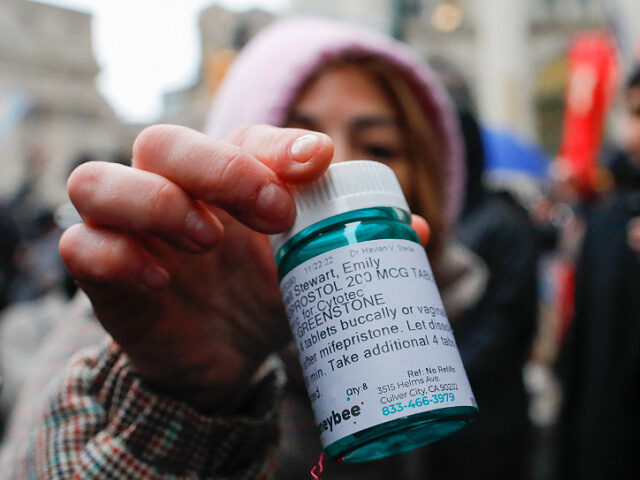Women who are not pregnant are stockpiling abortion pills, according to a new study published in JAMA Internal Medicine.
The practice of requesting a prescription for abortion pills without being pregnant is called “advance provision.” Such requests spiked during two recent periods, including after the May 2, 2022 leak of the Supreme Court’s draft decision in Dobbs v. Jackson Women’s Health Organization and after conflicting rulings in April 2023 about the U.S. Food and Drug Administration’s (FDA) approval of mifepristone, the first drug used in a two-drug medication abortion, Mother Jones reported of the study.
The research was conducted by studying data from Aid Access, a nonprofit whose doctors prescribe and mail abortion pills to women across the United States — including in states with laws protecting the unborn. Researchers reportedly found that the average number of daily requests to Aid Access for “advance provision” increased to about 247 requests per day in the seven weeks between the leak of the Dobbs decision and when the Supreme Court issued its final decision.
According to the report:
Once the Supreme Court issued its final ruling in June 2022, requests decreased to about 89 per day—but then they spiked again last April when conflicting rulings about the FDA approval of mifepristone thrust abortion pills back into the headlines, leading to an average of about 172 daily requests for advance provision of the pills.
It is important to note that the lawsuit challenging the FDA’s approval of mifepristone is currently pending before the Supreme Court, and abortion pills are still available.
Before the draft decision was leaked, Aid Access allegedly received roughly 6,000 “advance provision” requests, around 25 per day, according to the report.
Abigail Aiken, the study’s lead author and associate professor of public affairs at the University of Texas-Austin, said that nearly 75 percent of the study’s participants said they stockpiled abortion pills to “ensure personal health and choice” and “to prepare for possible abortion restrictions.”
Interestingly, the study found that the non-pregnant women who requested abortion pills the most were white and over 30 years old with no children who live in urban areas with lower-than-average poverty rates, according to the report.
“Most people who obtain abortions, on the other hand, are women of color, in their 20s, and already have children, data has shown, and nearly half live below the federal poverty line,” the Mother Jones report notes, continuing:
The discrepancy in the demographics of people who get abortions and those who manage to get advance provision of abortion pills is likely due, in part, to cost: Aid Access charges $150 for advance provision. The group offers funding for people who may not be able to afford the pills, but that assistance may not be as widely known.
The pro-abortion Guttmacher Institute found that mifepristone is used for more than half of all abortions in the United States. In 2020, the drug accounted for 53 percent of all abortions, up from 39 percent in 2017.
According to former abortionist Dr. Anthony Levatino, mifepristone blocks the action of progesterone, which the mother’s body produces to nourish the pregnancy. When progesterone is blocked, the lining of the mother’s uterus deteriorates, and blood and nourishment are cut off to the developing baby, who then dies inside the mother’s womb. The drug misoprostol (also called Cytotec) then causes contractions and bleeding to expel the baby from the mother’s uterus.

COMMENTS
Please let us know if you're having issues with commenting.